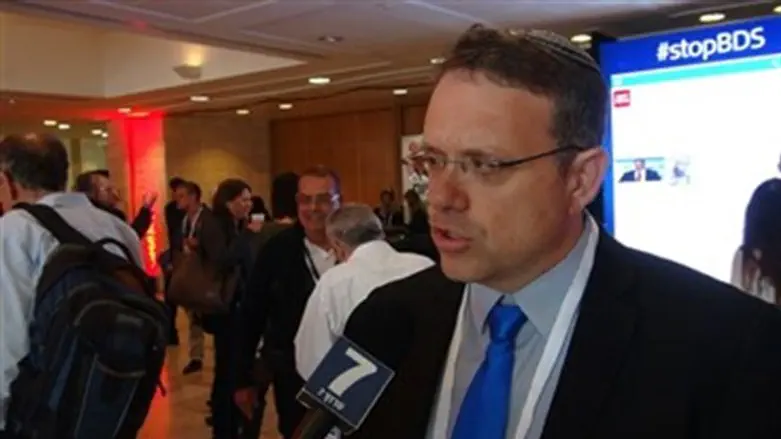
The deputy head of the World Zionist Organization (WZO), Yaakov Haguel, summed up the past year's activities for Arutz Sheva and spoke about the organization's goals for the coming year.
Haguel stressed right at the beginning that even if it appears that the Jewish nation and the state of Israel are suffering from a barrage of anti-Semitism and political boycotts, "we have been in much worse situations. We are familiar with anti-Semitism going back to Queen Esther and so many other cataclysmic events in our history, but today we have the state of Israel and we are going to be here forever."
He also emphasized that Israel serves as an extra margin of security for Diaspora Jews around the world.
"I meet with Diaspora Jewish communities and they feel much more secure than in the days before the establishment of the state. I have no doubt that this is the major change resulting from being a nation with a state. There may be many Jews who have not yet chosen to immigrate to Israel but we have no doubt that the existence of the state gives those communities a different feeling."
Haguel says that the past decade has seen a significant rise in anti-Semitism. "Every year sees more anti-Semitic attacks than previous ones. This year was also worse than previous ones and we are trying to counter these violent attacks. Our primary activity is with the Jewish communities. A large percentage of attacks go unreported as people are embarrassed about them or do not trust the authorities to deal with the attacks. We want to strengthen Jewish pride in our brothers in the Diaspora through conferences and other activities where we stress the need to report anti-Semitism."
Haguel cited a recent survey which stated that 74% of anti-Semitic incidents go unreported, saying that Diaspora Jews, as they always have, are hiding their heads in the sand hoping that it will all blow over.
"We, on the other hand, want them to learn to lift up their heads and stand tall. At the same time we call on sovereign governments to take responsibility for protecting their loyal citizens and making them feel secure."
Is the right response teaching Diaspora Jews to fight back and convince their attackers that it is not worth their while to prey on Jews?
Haguel referred to the example of the Beitar youth group in France which conducts courses in self- defense. However he stressed that WZO and its affiliated organizations have to react conventionally. Haguel is convinced that if Jews stand firm and unwavering and do not accept the situation, things will be different.
Do WZO representatives act this way and wear a kippah (skullcap) and other Jewish symbols when walking around European countries or do they prefer to wear hats?
"There are many places in Europe where I wear a hat outside. I'm not proud of it but I want to get back home to my family."
Haguel says that even though we cannot expect Diaspora Jews to flaunt their Judaism overtly ,they must report every incident of anti-Semitism and not resign themselves to attacks and slurs as a part of daily life. "Just as a person would go to the police if his car was burgled, he should complain to the police if his son was called a 'dirty Jew' and the police must do something about it."
Maybe the right response is not to raise their morale in the Diaspora, but to tell them to come to Israel?
"We stress that we want everyone in Israel and we have representatives encouraging immigration everywhere. We also conduct activities to encourage immigration. However the reality is that most Jews will unfortunately not immigrate to Israel and we can't force them to. I wouldn't pass judgment on them because it's easy for us to do so as we were born in Israel, whereas they live and work there and we have to understand why it's difficult for them. The Israeli government should streamline immigration procedures by automatically recognizing their prestigious academic degrees. In addition they must be assisted when they come to Israel. Everyone in Israel has neighbors who have immigrated recently and we need to see how to help them."
Another issue which Haguel deals with is inculcating Zionist values among Israeli youth in order to prevent them from emigrating. Haguel believes that modernization must be used to strengthen the concept of Zionism. However "the world is becoming a global village and we must see how to strengthen Zionist values in such a situation. There may be interesting things around the world but there's only one homeland."
How do you do this without being "suspected" of nationalism, xenophobia or far rightist policies?
"I talk about values and about the connection between the Jewish people and their land. We have no other homeland. Our ancestors are buried here, in the Cave of the Patriarchs and in Rachel's Tomb. Jerusalem is our eternal capital, but we who were born into this situation do not value it. We must talk to Jews everywhere about the two millenia of longing to live in Israel. Finally we are living here, going to school and work - this is true Zionism and the love of our homeland that we have become accustomed to."
What are WZO's plans for the coming year?
"In the coming year we will celebrate 120 years since the First Zionist Congress in Basel, the congress which caused such a revolution that within 50 years the state of Israel was founded. We are planning all kinds of events around this."
One of the challenges WZO faces is strengthening knowledge of the Hebrew language in the Diaspora. "We see that many communities neglect the Hebrew language and WZO has taken upon itself to strengthen knowledge of Hebrew in the Diaspora."